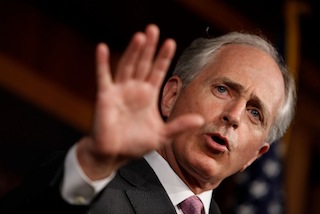Tension Abounds in Republican Calls for Budget Cuts and Nuclear Modernization
April 28, 2011
Featured Image
Today's top nuclear policy stories, events, and analysis with excerpts in bullet form.
Stories we're following today - Friday, April 29, 2011:
Sen. Bob Corker's Priorities: Modernization of the Nuclear Weapons Complex vs. Reduction in U.S. Spending - Frank Munger in Knoxville News [link]
- As Sen. Corker preaches fiscal conservatism and wants to mandate spending caps, what about the extra money [he supports giving] the nucelar weapons complex? Is he willing to compromise on modernization to bring spending under control?
- "My support for modernization isn't about any particular facility," he said. "It's just about the fact that our nuclear arsenal is absolutely obsolete. I saw neutron generators, literally, out in New Mexico that will quit working in the year 2015, which means it renders the weaponry totally obsolete."
- "I think the first thing we have to do is figure out where are we going. Let's agree to where we're going over the next 10 years. Let's agree to what we're going to spend. Let's do that first, OK?"
- MJ Note: Expect nuclear experts to promptly refute the second bullet and reinforce the third.
A New ICBM? - Kingston Reif in Nukes of Hazard [link]
- The administration and the Air Force have been unable to tell a consistent story about what they plan to spend on preparatory analysis for a possible replacement for the Minuteman III ICBM.
- The spotlight should be less on whether a few million dollars may or may not be available in FY 2012 to study a new ICBM, and more on the necessity and feasibility of developing and deploying a new ICBM, to say nothing about replacements for the other two legs of the triad…
- This raises the question of whether a U.S. force of say, 1,000 deployed warheads, would alter U.S. requirements in terms of delivery vehicles? Would it make sense to maintain all three legs of the triad at such levels? Could the U.S. guarantee its own security and that of its allies in a more fiscally sustainable manner with a smaller nuclear arsenal?
Panetta's Mission: Can He Cut the Pentagon? - Lawrence Korb and Laura Conley for CNN [link]
- The Bush administration regularly funded the wars in Iraq and Afghanistan through separate bills outside the regular budget calendar, a process that obscured the truly astronomical amount of annual defense spending and offered opportunities for Congress and the administration to fund additional programs, such as the F-22 and missile defense, that had little or no relevance to the wars.
- [Leon] Panetta will have to get right down to work. He'll immediately face three critical challenges: Delivering on Obama's promised cuts in security spending, maintaining fiscal sanity during three wars and managing the often contentious debate between the Pentagon and Congress.
- Panetta undoubtedly has the skills and experience needed to begin to tackle these three challenges. His past work as the director of the Office of Management and Budget in the Clinton administration should give him the credibility and capability needed to make tough choices in military spending.
Stupidity Goes Nuclear — Ejaz Haider for International Herald Tribune [link]
- An April 19 press release from the Inter-Services Public Relations (ISPR) tells us that Pakistan has “successfully conducted the 1st flight test of the newly developed Short Range Surface to Surface Multi Tube Ballistic Missile Hatf IX (NASR)” which is supposed “to add deterrence value to Pakistan’s Strategic Weapons Development programme at shorter ranges”.
- I wish I could rejoice in this “achievement”. Let’s consider some aspects of nuclear strategy, avoiding, as far as possible, technicalities to analyse this system’s test.
- Moreover, our deterrence is pegged on NOT fighting a war, i.e., ensuring prevention of war by denying India its conventional advantage. This weapon system is about fighting a war, or supposed employment in case hostilities break out. That makes a mockery of our basic strategic requirement.
Jimmy Carter Criticizes U.S., South Korea for Refusing Food Aid to North Korea - Bomi Lim for Bloomberg [link]
- [Former President Jimmy] Carter, 86, made a second trip to North Korea in less than a year this week to help push forward stalled multinational talks on ending Kim Jong Il’s pursuit of atomic weapons.
- Carter and three former European leaders urged immediate donations of food to North Korea, where the United Nations says more than 6 million people need food assistance.
- “To deliberately withhold food aid to the North Korean people because of political or military issues not related is really indeed a human rights violation,” Carter told reporters yesterday in Seoul.



